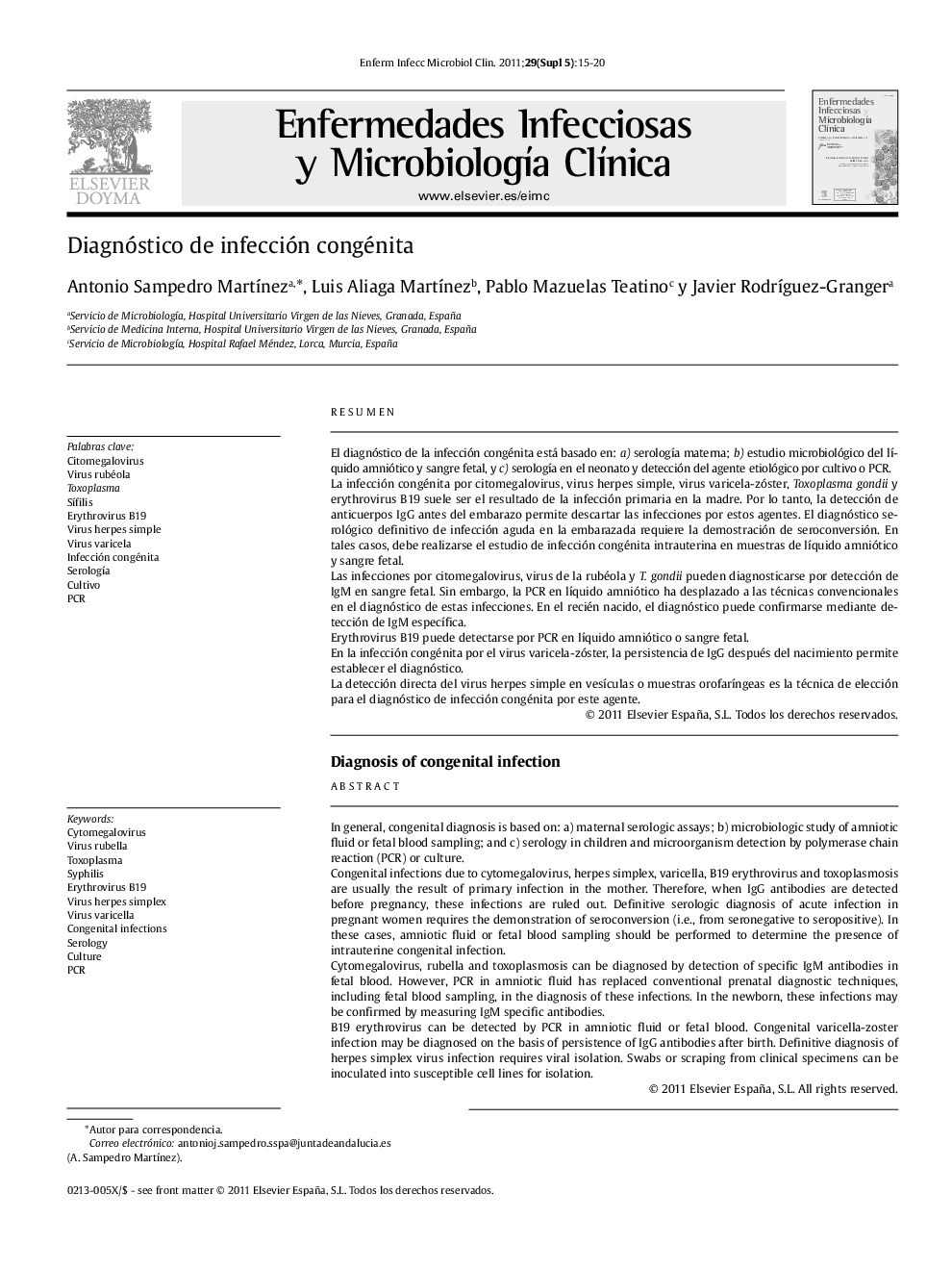| کد مقاله | کد نشریه | سال انتشار | مقاله انگلیسی | نسخه تمام متن |
|---|---|---|---|---|
| 3401825 | 1222685 | 2011 | 6 صفحه PDF | دانلود رایگان |

ResumenEl diagnóstico de la infección congénita está basado en: a) serología materna; b) estudio microbiológico del líquido amniótico y sangre fetal, y c) serología en el neonato y detección del agente etiológico por cultivo o PCR. La infección congénita por citomegalovirus, virus herpes simple, virus varicela-zóster, Toxoplasma gondii y erythrovirus B19 suele ser el resultado de la infección primaria en la madre. Por lo tanto, la detección de anticuerpos IgG antes del embarazo permite descartar las infecciones por estos agentes. El diagnóstico serológico definitivo de infección aguda en la embarazada requiere la demostración de seroconversión. En tales casos, debe realizarse el estudio de infección congénita intrauterina en muestras de líquido amniótico y sangre fetal.Las infecciones por citomegalovirus, virus de la rubéola y T. gondii pueden diagnosticarse por detección de IgM en sangre fetal. Sin embargo, la PCR en líquido amniótico ha desplazado a las técnicas convencionales en el diagnóstico de estas infecciones. En el recién nacido, el diagnóstico puede confirmarse mediante detección de IgM específica.Erythrovirus B19 puede detectarse por PCR en líquido amniótico o sangre fetal.En la infección congénita por el virus varicela-zóster, la persistencia de IgG después del nacimiento permite establecer el diagnóstico.La detección directa del virus herpes simple en vesículas o muestras orofaríngeas es la técnica de elección para el diagnóstico de infección congénita por este agente.
In general, congenital diagnosis is based on: a) maternal serologic assays; b) microbiologic study of amniotic fluid or fetal blood sampling; and c) serology in children and microorganism detection by polymerase chain reaction (PCR) or culture.Congenital infections due to cytomegalovirus, herpes simplex, varicella, B19 erythrovirus and toxoplasmosis are usually the result of primary infection in the mother. Therefore, when IgG antibodies are detected before pregnancy, these infections are ruled out. Definitive serologic diagnosis of acute infection in pregnant women requires the demonstration of seroconversion (i.e., from seronegative to seropositive). In these cases, amniotic fluid or fetal blood sampling should be performed to determine the presence of intrauterine congenital infection.Cytomegalovirus, rubella and toxoplasmosis can be diagnosed by detection of specific IgM antibodies in fetal blood. However, PCR in amniotic fluid has replaced conventional prenatal diagnostic techniques, including fetal blood sampling, in the diagnosis of these infections. In the newborn, these infections may be confirmed by measuring IgM specific antibodies.B19 erythrovirus can be detected by PCR in amniotic fluid or fetal blood. Congenital varicella-zoster infection may be diagnosed on the basis of persistence of IgG antibodies after birth. Definitive diagnosis of herpes simplex virus infection requires viral isolation. Swabs or scraping from clinical specimens can be inoculated into susceptible cell lines for isolation.
Journal: Enfermedades Infecciosas y Microbiología Clínica - Volume 29, Supplement 5, December 2011, Pages 15-20